According to Robin, their requests for information were uniformly blocked. The chaplain she had called in early July denied having ever had a conversation with her. (The hospital’s police officer who had spoken with Carol also denied talking with her.) Because Coons had left no suicide note, the family asked to see his Day-Timer. When it was produced, Robin noticed that all the pages between June 3 and August 3 were missing. “That makes no sense at all,” she said. “James wrote in his Day-Timer every single day.” Then, during a lunch break, Robin, Richard, and Carol slipped into one of the psychiatric wards to see if they could find that third-year resident, but they were told that they were not allowed to be in there. Robin says the criminal investigator informed her that if she and Coons’s parents caused any more trouble, he would have them arrested.
They went home with more questions than answers. They still had not been told why no one from the hospital had ever gone by to check on Coons when he missed his initial appointment at the outpatient clinic. And they were especially tormented by the fact that the death certificate declared his date of death as being July 4, a holiday that for Coons was as important as Christmas. When the hospital employee had found him at four o’clock in the morning, he’d noticed a terrible smell, which led him to believe that Coons had been dead for some time. But the medical examiner had put down July 4, because that was the day he had been found.
Carol called Theola Labbe, a respected Wash ington Post reporter who covers military issues, to see if she could find out any answers about why Coons had been left alone for so long. All Labbe received was a statement from a Walter Reed official that read, in part, “Regrettably, even with the highest level of care, suicide is not always predictable or preventable.” Another reporter also noted that the staff at the Mologne House was now being required to conduct mandatory daily inspections of every room as a suicide-prevention measure.
But after another soldier was found dead at Walter Reed, in January 2004—he had hanged himself in Ward 54, one of the psych wards, where he was supposed to have been watched night and day—Mark Benjamin, a correspondent for Salon, wrote that “inadequate suicide watch” continued to be a problem. Furthermore, he wrote, “Psychiatric techniques employed at Walter Reed appear outmoded and ineffective compared with state-of-the-art care as described by civilian doctors.” He added that the hospital tended to ignore one-on-one counseling in favor of group therapy administered by medical students and residents. He also quoted an Army colonel who had been sent to Walter Reed to get psychiatric help. “The Army does not want to get into the mental-health game in a real way to really help people,” the colonel had said. “They want to Band-Aid it. They want you out of there as fast as possible, and they don’t want to pay for it.”
Such a statement is particularly disturbing in light of the fact that the most recent statistics indicate that more and more emotionally shattered soldiers are coming home from the Persian Gulf. In May 2005 a Department of Veterans Affairs analysis of 50,000 troops returning home found that 26 percent were afflicted by mental disorders caused by wartime service and that more than half of those soldiers were suffering from major depression, anxiety, or post-traumatic stress disorder. And many psychiatrists believe that the numbers will only climb higher, because so many mental health problems do not emerge until months after the soldiers have come home.
It is also no secret that the military’s mental health system is not ready for such a scenario. Adjusted for inflation, the VA’s annual spending for services for the seriously mentally ill decreased by $630 million between 1996 and 2003. Its number of mental health staffers during that same period declined by 31 percent. Though Congress has increased funding by 18 percent over the past two years, no one is claiming victory. A recent study in the medical journal General Hospital Psychiatry found that the staffers and doctors at the VA’s primary clinics are recognizing fewer than half of the PTSD cases that are brought before them.
IN OTHER WORDS, there are likely to be many more James Coonses. Between the beginning of the war and July 2005, 58 U.S. soldiers committed suicide in Iraq; 29 more committed suicide after returning home. “They are the forgotten soldiers,” Robin says. “On Veterans Day, when the newspapers list the names of all those who died for their country, they are the ones who usually get left off the page, or if they are mentioned, an asterisk is put beside their names so that readers will know that they supposedly weren’t as good as the others who died.”
In December 2004 Robin requested a form from the Department of Defense called “Application for Correction of Military Record Under the Provisions of Title 10, U.S. Code, Section 1552,” and she wrote in wobbly handwriting: “I feel it is unjust that my husband served 17 years in the Army defending his country, and that when he got sick (due to the war) he was just forgotten. We have two small daughters, and I think they should see his name on a ‘Hero’ list one day.”
She assumed the letter would be lost somewhere within the maze of offices at the Pentagon. To her astonishment, she received a reply from the Army one month later, in January 2005, indicating that Coons’s name had been placed on the casualty-of-war list for Operation Iraqi Freedom. The one thing she was unable to do, however, was get Coons’s official date of death changed.
When she read in the Army’s investigative report of Coons’s death that an Army pathologist had concluded that he had been dead at least two days before his body was found, she contacted the District of Columbia’s medical examiner’s office, only to be told that its policy was to declare the date a body had been found as the date of death. U.S. representative Michael McCaul, who represents the area where Coons’s parents live, also got involved, even asking the Secretary of Defense and his staff to help get Coons’s date of death changed. But the medical examiner’s office refused to alter its policy. “A bureaucratic nightmare,” says McCaul. “It seems altogether wrong and defies belief that the government, for whatever reason, cannot see fit to make this simple change.”
But Robin wasn’t about to let someone in Washington, D.C., decide her husband’s legacy. She ordered a headstone for him that read simply: “Master Sergeant James C. Coons. April 3, 1968—July 1, 2003. Operation Iraqi Freedom.” She had the headstone placed over his grave at the cemetery in Conroe where he is buried. Next to the grave, she installed a granite bench with a photo of Coons, herself, and their daughters. She also planted an oak tree near the grave, from which she hung wind chimes. And next to the headstone itself, she placed small U.S. flags, each about a foot high.
“On July 1, we come out here to honor James,” she says. “And on July 4, we still gather to honor our country. No matter what happened to my James, we still will honor our country. That’s what James would have wanted.”
For the story behind this story, read our interview with executive editor Skip Hollandsworth.
Tuesday, June 12, 2007
Casualty of War 6
Labels:
Casualty Officers,
Coons,
Gold Star Families,
OIF history,
sacrifice,
Shared Works
Subscribe to:
Post Comments (Atom)
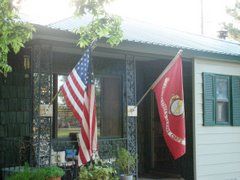
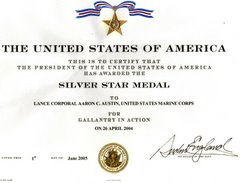
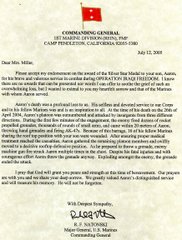
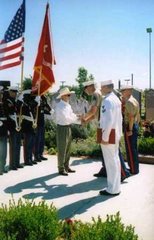


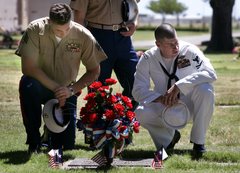

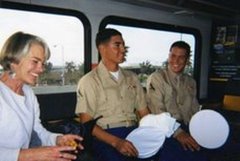

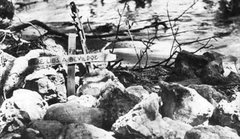


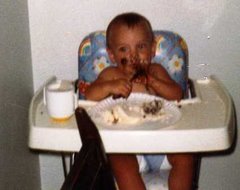


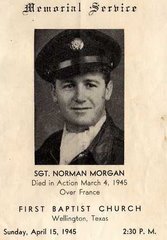



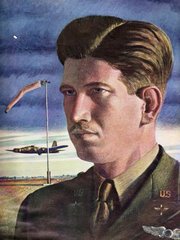

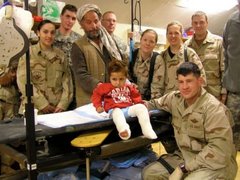


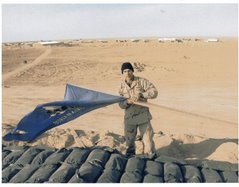



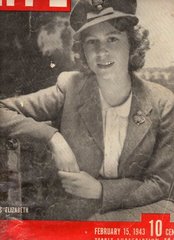


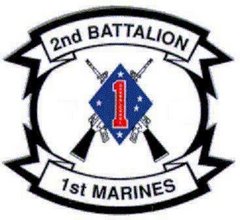




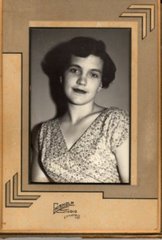

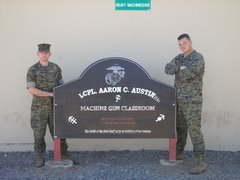

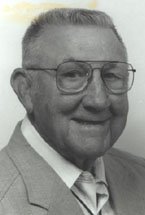

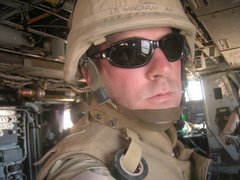
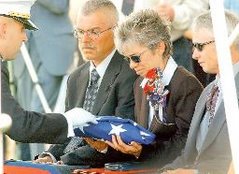


4 comments:
What a sad sad story! It makes me sick to my stomach that the military would not step up and own up to what really happened. PTSD is a very serious disorder that will be with these guys for the rest of their lives. They deserve to get the treatment they need and the support they deserve from our government. I feel so bad for the Coons family, if only James could have recieved the help he so desperately needed, but was denied and forgotten about. We certainly weren't prepared for the high amount of casualties, injuries and the devastating aftermath of this war, but it is no excuse to not be there for these men and women who have given there all for our country and the families left here to deal with what comes next! Something has got to change so no other soldier or family has to ever endure this alone!
I couldn't agree more, Chantal. It is a fact of war that has been hush-hush too long.
The American public is not a bunch of idiots. We of course know that Stress At All Levels will take place. It has to be addressed and the stigma removed if at all possible. When we talk about sacrifice, these men and women who go each sacrifice a great deal. It is up to the chain of command to encourage this, so alas, there will be those who fall through the cracks.
Of course, we've since found out what a nightmare WRAMC is.
On the other hand, we are talking about an E-8, well on his way to commanding an entire BN. (600 + troops, depending on how many companies are in the battalion)so at his rank, he was not questioned, but given an open pass basically for medication and privacy.
Once his career failed, no doubt, with such a driven personality and hallucinations, the end was something no one that knew him could have imagined.
And all the government money and programs in the world cannot fix what is not talked about.
I cannot believe he was not given something for the hallucinations.
WWII vets, Vietnam vets, there are a great many that were left alone with their stories. Perhaps then, we thought it was better if we didn't talk about it. I hope we've wised up. It's real and a part/fact of war and we should not be afraid to talk about it anymore than we are to talk about and plan for the GI Bill or Paralyzed Veterans.
We owe these our lives. We can at the very least give them top-notch medical/psych assistance when they get home. If need be, slice some of the rebuilding money for our troops health care and job assistance.
We have the best military in the world. But let's not be afraid to talk about what's wrong. Let's help fix it.
But girl, look at what a mess immigration is. This one won't get fixed for a while I'm afraid.
The horror of James Coons' death is thinking of him alone and forgotten in that room. He was let down by so many in the Army and then to lie to his widow...If this were a one-time death of a Warrior that would still be intolerable for a nation which is deserting, yes deserting, our Troops. To think that these men and women willingly sacrifice their lives, endure the hell of deployment and combat, only to come home to not knowing if their physical and emotional needs will be met is an added nightmare that they, and their families, don't deserve. It's all well and good for the Army to feel that "appropriate measures" have been implemented, but why should this have occurred in the first place? After the 1st Gulf War, the Pentagon knew that increasing numbers of Troops were facing a lifetime of psychological challenges and yet it appears as if nothing was done to provide treatment for those Veterans. De'on, I am barely able to comprehend how much is left up to our Troops and their families let alone think of Mrs. Coons having to face the fact that little, if nothing, has been implemented to prevent another such tragedy from happening to another Warrior and their family. I don't believe that I have been so afraid for returning Military personnel as I am now, knowing that the struggle for them is never ending once they are home.
God Bless you, De'on and you, too, Chantal. Please take care of your husband and let him know that his suffering wasn't taken for granted by this Canadian. These aren't mere words, but what I feel is important for every service-member to know...that they are individually recognized for their service and sacrifice. Keep posting, please, and I'll be here.
Veritas et Fidelis Semper
This was a tough, tough story to read, but something that we all as Americans need to be aware of. Our soldiers and Marines are SO important and we need to do everything we can to be there for them and get them the help they need.
Post a Comment